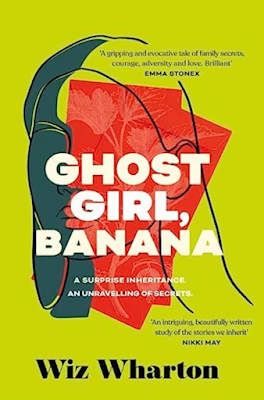Tuesday, 1 August 2023
Food glorious food – a feast of stories from Read Paper Republic
Saturday, 29 July 2023
Bugis Nights by, Chris Stowers
Devika Misra and Chris Stowers discuss his debut travel narrative, Bugis Nights.
It’s taken Taiwan based writer and photo journalist Chris Stowers nearly 35 years to publish his debut travel narrative Bugis Nights. This light but exciting read is part memoir and part fantasy. Stowers chronicles his journey on both land and sea as a young backpacker across Asia in the late nineteen eighties. Basing much of his story on diaries and photographs, Stowers harks back to a time when travel, he says, was “simpler, easier slower”…essentially more fun!. But Stowers’ story is about far more than the trials and triumphs of a young naive explorer. It is an endearing and perceptive observation of human behaviour in tough circumstances. With quiet humour, Stowers illustrates the courage, optimism and openness of the itinerant backpacker.
Thursday, 27 July 2023
Eternal Summer of the Homeland: Agnes Chew talks about writing a story collection and being the Asia Winner of the CSSP
 |
| Courtesy of Author |
The stories in Agnes Chew’s first fiction collection illuminate the complexity of choice when duty and desire collide, and what a person is willing to sacrifice. A daughter grapples with an unexpected discovery in the aftermath of her mother’s death. A husband struggles to understand his wife’s reaction to her pregnancy. An adolescent and a domestic worker exchange secrets whose weight they find they cannot bear. And in a corner of Changi Airport, a nondescript office cubicle, a patch of open forest, others strive to find meaning and home.
 |
| Courtesy of Author |
Author Bio:
Agnes Chew is the author of Eternal Summer of My Homeland (2023) and The Desire For Elsewhere (2016). Her work has appeared in Granta, Necessary Fiction and Litbreak Magazine, among others, and her story, ‘Oceans Away from my Homeland’, won the 2023 Commonwealth Short Story Prize (Asia Region). She holds a Master’s degree in international development from LSE; her prize-winning dissertation, which examines inequality and societal well-being in Singapore, was featured in Singapore Policy Journal. Born and raised in Singapore, she is currently based in Germany.
_________________________
EC: Agnes, welcome to Asian Books Blog, and congratulations on being the Asia Winner for the Commonwealth Short Story Prize as well as the publication of Eternal Summer of My Homeland. Let’s start with this: what draws you to the short story?
AC: Thank you so much, Elaine, for your kind words and for this opportunity! I actually started out writing creative nonfiction, and when I ventured into the realm of fiction writing, the short story form felt like a natural (and conceivable) choice. The more short stories I wrote, the more I found myself drawn to the form. I appreciate its requisite focus on purity and intensity—the way it compels you to distil meaning within a compact space. It’s also a thrill to be able to write a short story within a feverish span of hours or days, especially when I compare it to the far longer process of writing a novel, which I’m now working on.
Saturday, 15 July 2023
Play the Red Queen - A Vietnam War Crime Thriller
Saigon 1963 – multiple American military advisers and South Vietnamese Army officers are gunned down by the mysterious Red Queen, a deadly Vietnamese assassin. Two MP detectives, Ellsworth Miser and Clovis Robeson, are called in to investigate but find themselves stumbling into a mystery that's much deeper with international implications.
Wednesday, 5 July 2023
Singaporean writer Soon Ai Ling's stories are translated, transcreated and adapted by Yeo Wei Wei. An interview with Nicky Harman
Diasporic and Clan are two volumes of short stories by the sinophone Singaporean writer Soon Ai Ling, translated, transcreated and adapted by Yeo Wei Wei. Yeo has done a translation of Soon stories in Diasporic, and then transcreated and adapted them in Clan. As a translator myself, I was intrigued by this adventure in story-telling, so I asked Yeo Wei Wei to tell me more.
NH: could you tell me how you came across Soon's stories and what attracted you to them?
WW: I received an email from Ailing one day out of the blue whilst I was in Norwich doing my MA in Creative Writing. She had asked Eva Tang about my translation of the subtitles and song lyrics for Eva’s documentary The Songs We Sang. She liked my translation very much and wished to approach me to ask if I would translate her fiction. After I finished my MA, I returned to Singapore and I looked for Ailing’s book of short stories in the National Library. I read them and I also watched Eva’s short film that was based on Ailing’s story “Chef Tham”. Ailing’s stories are set in China, Hong Kong, Malaysia, and Singapore. The Chinese diasporic contexts in these different countries are the basis of the rich story worlds found in her fiction. She is unique for this reason, amongst Singaporean Chinese authors. I was also attracted to the predicaments of her protagonists. Very often, her stories deal with the private struggles of men and women in traditional Asian family settings. They are individuals torn between personal desires and family history, hierarchy, family values and expectations.
Thursday, 29 June 2023
Ghost Girl, Banana: Elaine Chiew Chats With Acclaimed Debut Novelist Wiz Wharton
About the Book:
Set between the last years of the “Chinese Windrush” in 1966 and Hong Kong’s Handover to China in 1997, a mysterious inheritance sees a young woman from London uncovering buried secrets in her late mother’s homeland in this captivating, wry debut about family, identity, and the price of belonging.
Hong Kong, 1966. Sook-Yin is exiled from Kowloon to London with orders to restore honor to her family. As she strives to fit into a world that does not understand her, she realises that survival will mean carving out a destiny of her own.Thirty years later in London, having lost her mother as a small child, biracial misfit Lily can only remember what Maya, her preternaturally perfect older sister, has told her about Sook-Yin. Unexpectedly named in the will of a powerful Chinese stranger, Lily embarks on a secret pilgrimage across the world to discover the lost side of her identity and claim the reward. But just as change is coming to Hong Kong, so Lily learns Maya’s secrecy about their past has deep roots, and that good fortune comes at a price.
Heartfelt, wry and achingly real, Ghost Girl, Banana marks the stunning debut of a writer-to-watch.
About the Author:
 |
| Wiz Wharton, Courtesy of Author |
_________________________
EC: Congratulations on your debut novel, Ghost Girl, Banana, which has just launched to much critical acclaim in the UK. In your acknowledgement, you mentioned the story’s inception as ‘the discovery of some old-fashioned floppy discs in a box’. Can you tell us about how a whole novel was borne out of this discovery?
WW: Yes, so this happened back in 2020 when I was moving house and discovered the discs in a box of my late mum’s possessions. Initially, I had no idea what they were, and it was only later that I discovered they were transcriptions of her diaries, kept since she arrived in the UK in the early sixties as an immigrant from Hong Kong. Although painful to read in parts, they were also transformative in revealing so many of her experiences which she had never really spoken about during her lifetime. That stoicism is germane to many women of that generation, I think, as much as it’s also a cultural thing, but I remember wondering how many other hidden stories there were out there, and what a tragedy it was that they weren’t more represented in the British fiction space. As much as a novel is always an ambitious creative project to embark upon, I had a whole wealth of information in front of me to draw upon, so I was very fortunate in that respect.
Friday, 26 May 2023
Now Boarding: Experiencing Singapore through travel 1800s–2000s
T.A.Morton gives a sneak preview of Now Boarding, an exhibition opening on May 27 at the National Museum, Singapore.
In 1956, writer W. Somerset Maugham permitted Raffles Hotel to use his words for their latest marketing campaign. His words were, 'Raffles Hotel stands for all the fables of the exotic East.' Such a testimony from a well-known writer was priceless and Raffles promptly used them in their advertisements, on their menus and matchboxes.






